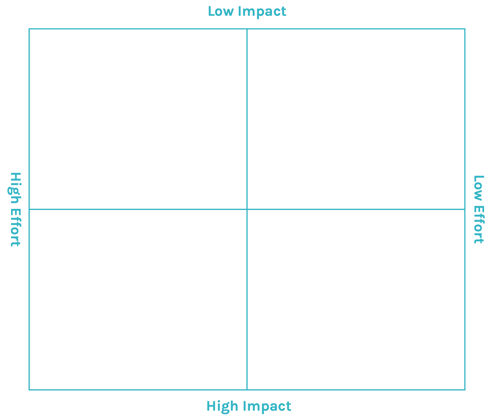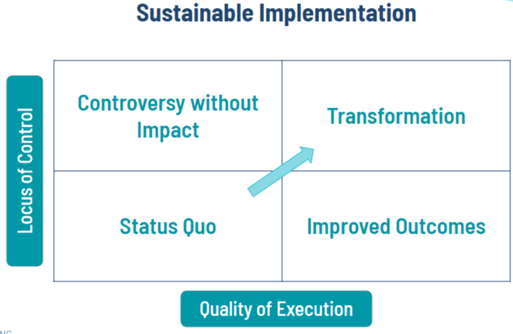Educators frequently find themselves navigating leadership and decision-making roles with little to no job-specific training in how to gain buy-in, generate innovative ideas, and build strong teams. To empower these leaders, it's essential to provide them with professional learning content that goes beyond theory, offering practical tools to initiate successful change and guide the implementation process.
The Branching Minds Professional Services Team spent the summer researching and delivering tailored professional learning content focused on honing leadership skills, recognizing that effective leadership is the linchpin for the successful implementation of any large-scale initiative, including MTSS.
| |
By prioritizing the development of leadership competencies first, our content equips leaders with the strategic mindset, communication abilities, accountability strategies, and collaborative prowess needed to navigate the complexities of transformative initiatives. |
|
Our results are so exciting and powerful that we no longer want to keep these secrets to success, secrets! Let's explore the top three strategies we use to create professional learning that catalyzes leadership growth.
Secret #1: Embrace Real-Life Strategies in Micro-Learning
One of the keys to effective professional learning lies in the immediacy of its application. Educators have limited time, so our content is designed to be concise, relevant, and readily applicable in real-world scenarios. By focusing on strategies that can be implemented immediately, we ensure that leaders can seamlessly integrate their learning into their day-to-day practices.
|
How do we do it?
Say goodbye to lengthy sessions that leave leaders overwhelmed. Micro-learning is a game-changer for educators with busy schedules. Short, impactful bursts of knowledge ensure immediate application in real-world scenarios, allowing leaders to integrate their learning into their daily practices seamlessly using current real-life issues for context.
- Define a Clear Objective: Outline each micro-learning session's specific and focused learning goal. Instead of all the information, focus on a particular learning objective.
- Keep it Short and Engaging: Limit session durations to 25 minutes, with only 10 minutes of instructional delivery and the remainder for hands-on practice.
- Ensure relevance: Share diverse content with tools that work in different situations so everyone can join. We like to use tools that help teams learn how to collaborate and problem-solve. One example is concentrating solely on acquiring the skills to use a quadrant (see example below) for mapping impact and effort priorities. This tool assists teams in deciding whether a task should be prioritized or delegated, considering the effort required and the potential impact it can have.

- Encourage Participation Between Participants: Active learning should involve conversations that take people where they want to go. Focus less on the task and more on the learning; just have fun!
|
Secret #2: Provide Explicit Instruction on Practical Tools
In our experience, professional learning is most effective when it goes beyond mere compliance training. Our second secret strategy emphasizes providing explicit instruction on the practical application of tools in various situations, leading to deeper understanding and confidence.
|
How do we do it?
We no longer exclusively emphasize compliance training as the primary focus of professional learning. It's not just about foundational learning, theory, or simply introducing a tool; it's about empowering leaders to wield it confidently across diverse challenges. We're talking about skills that transcend theory, providing leaders with the practical know-how to navigate their unique leadership landscapes. Our sessions use specific protocols that help leaders:
- Turn problems into questions to solve
- Develop and strengthen teams
- Identify root cause
- Brainstorm and ideate as a team
Why We ❤️ Protocols:
Our session protocols were designed to slow teams down and give space for better planning and problem-solving. Taking time to engage in protocols fosters deeper collaboration and better outcomes. Sometimes, we need more than a simple chart to document our goals; we need to dig deep to develop wide-reaching goals or create a visual representation of our analysis. Not only are the protocols super engaging in the session, but participants can learn these protocols and use them with their peers when they return to campus to work on MTSS or anything!
Are you interested in checking out one of our protocols for leaders?
>> Check out our Data-Driven Reflection Tactic to move your teams from problem-solving to data-driven planning with this protocol.
>> Also check out our on-demand EdWeek webinar: How to Lead for Improved Student Outcomes Using Real-Time, Real-Life Insights
|
Secret #3: The Catalyst for Change is Empathy
Leadership is not just about authority; it's about understanding the individuals you lead. Professional learning must actively cultivate empathy in all leaders. Schools are complex ecosystems where collaboration and synergy among educators are essential for achieving collective goals. Empathy fosters a collaborative and supportive culture within educational institutions, ultimately contributing to more effective and inclusive leadership.
|
How do we do it?
Empathy empowers leaders to navigate relationships within their “sphere of influence” — up, down, and sideways. A culture of empathy contributes to more effective, supportive, and inclusive leadership — a win-win for everyone involved.
- We coach MTSS leaders to recognize the areas where they have significant influence, whether through formal roles or informal connections within their organization.
- We model it! We intentionally recognize and empathize with the perspectives, challenges, and needs of those within our own influence, including the school and district leaders we serve, so that we can adapt our leadership training approach to be as inclusive and supportive as possible.

|
Professional Learning That Empowers and Molds Leaders
A title or job description alone does not make someone a leader. As great teachers are promoted to become great leaders, they must develop leadership competencies to build and guide teams. Professional learning that equips school leaders to manage and sustain change is crucial for the future of education as the implementation of evidence-based strategies (like MTSS) continues to grow in importance.
Leadership is a journey; with the right tools, it becomes a journey of empowerment, collaboration, and continuous improvement.
Want support for your team?
Branching Minds Professional Services Can Help
Acknowledging the crucial gap between leadership development and change management, Branching Minds Professional Services Team has curated a series of professional learning sessions to enhance practical leadership capacity within states, districts, and schools. These sessions are thoughtfully structured to accommodate both formal and informal leaders: our movers and shakers in our schools. And, they have been “road tested” by school and district leaders.
We aspire to bridge the gap between leadership roles and the essential skills necessary to drive impactful change in educational settings.
|
|
Are you ready to learn more about the effective leadership and change management support offered by Branching Minds?
>> Reach out to us today <<
|
|
💡 ADDITIONAL RESOURCES YOU MAY FIND HELPFUL:
🚀 Make Your MTSS Efficient and Effective With the Branching Minds Web Platform
Learn more by requesting a demo today!

|
Comments (0)